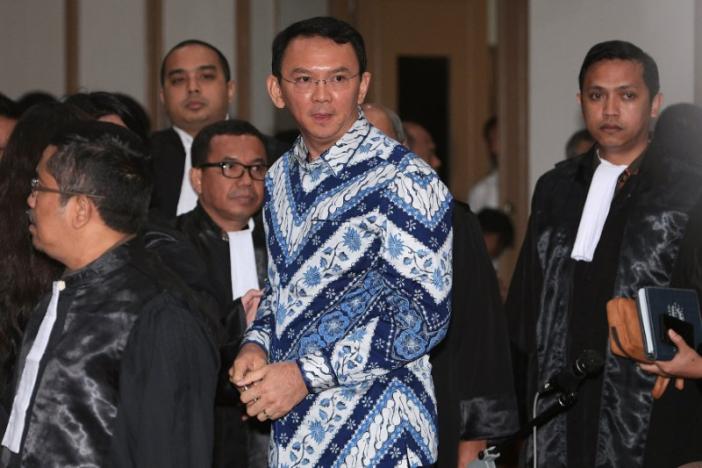Jakarta’s once hugely popular governor is being held in a simple room at a high-security detention center, his only comforts a Bible and visitors twice a week. It’s a grim new life following his conviction for insulting Islam in Muslim-majority Indonesia.
Basuki Tjahaja Purnama was hurriedly transferred to the high-security police facility in a suburb of the city early on Wednesday after his supporters surrounded the Jakarta jail he was initially sent to.
His sister said the family also feared his life was in danger from furious Islamists.
“The religious people have been saying in the mosques that his blood is haram (forbidden) and that killing him is good,” Fifi Lety Indra, the sister and head of his legal team, told Reuters. “This is necessary protection and it gives us peace and comfort that he’s there.”
His two-year imprisonment on Tuesday was much harsher than the suspended sentence the prosecution had sought for the ethnic-Chinese Christian governor, prompting warnings that Islam is creeping into politics and the judiciary of the secular nation.
The blasphemy conviction is a stunning downfall for the close ally of President Joko Widodo. Brash and unafraid to take on the moneyed elite, Purnama – popularly known by his Chinese nickname ‘Ahok’ – was widely admired for his no-nonsense drive to modernize a chaotic city long plagued by traffic and flooding.
His fortunes turned last September, when he was seeking re-election. He said his political rivals were deceiving people by using a verse from the Koran to say Muslims should not be led by a non-Muslim. Indonesia is the world’s largest Muslim-majority country.
Purnama denied the blasphemy allegation but apologized for the comments. But hardline groups drew hundreds of thousands of protesters onto the streets of Jakarta, calling for him to be sacked and jailed for insulting Islam’s holy book.
Popular sentiment turned against him after those demonstrations and he lost his bid for another term as governor in elections this year. His trial, which began late last year, took religious tensions in Indonesia to their highest in years.
BLOCKING TRAFFIC
Purnama was initially taken to Cipinang Penitentiary in East Jakarta, a Dutch colonial-era high-security prison notorious for its overcrowding and home to convicted drug offenders and Islamist militants.
He was moved to a police compound in Depok on the outskirts of Jakarta because his supporters were blocking traffic around the Cipinang prison. Some even attempted to topple a barbed-wire fence there.
His sister Indra brought their mother to meet him in Depok on her birthday.
“We met him in prison with our Muslim siblings, we hugged, we cried. The whole thing happened so fast,” Indra said.
Though Purnama was born to non-Muslim parents and is a Christian, he was adopted by a Muslim family on the tiny island of Belitung, off Sumatra.
He does not have a phone or a television in the police facility, and Indra said the only book he took with him was a Bible. “He loves reading his Bible. He has it with him and he can pray whenever he wants,” she said.
Purnama was allowed to bring his own clothes and toiletries, she said. “I can say he’s being treated very well and humanely. We are very grateful for that.”
SENTENCE
Indra said he is in a “temporary holding room” but is likely to be moved to a private cell soon. He will be allowed visitors twice a week for two hours each time, she said.
Purnama’s legal team is preparing an appeal to challenge his prison sentence.
His lawyers have also submitted a request to the Jakarta High Court to have his sentence commuted to a ban on him traveling outside Jakarta.
Purnama was due to stay in office until October, when the winner of April’s run-off election, Anies Baswedan, will take over.
Indra paid tribute to President Widodo, under whom Purnama had served as deputy governor of Jakarta before taking charge of the city when Widodo won the presidency in 2014.
“We understand how difficult the situation is for him but he’s a wise man,” she said. “He and my brother have a beautiful bond of friendship still.”
(Additional reporting by Fergus Jensen; Editing by John Chalmers and Bill Tarrant)




